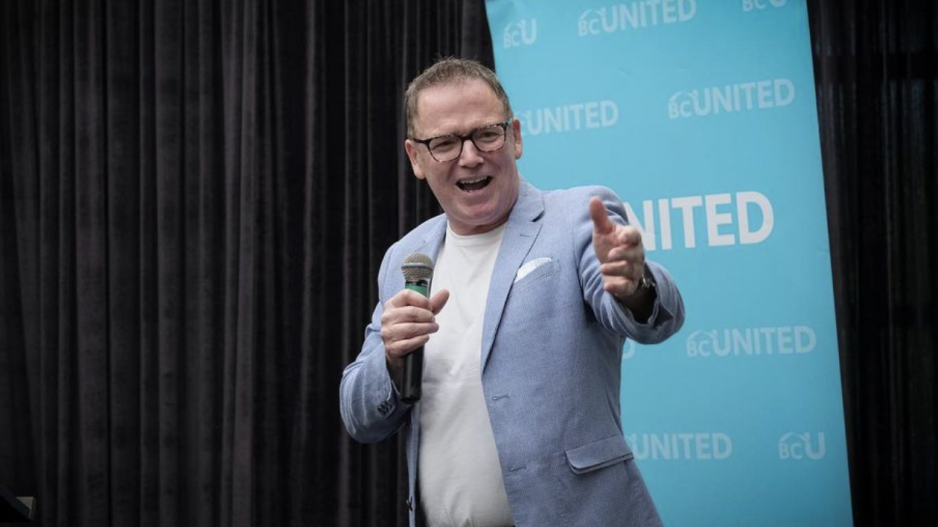Is the solution to the middle-class housing squeeze new government-built rental apartments, or a rent-to-own program that partners with the private sector? Those two different approaches by the governing NDP and Opposition BC United this week begin to paint a clearer picture of the contrast in housing policy facing voters in this fall’s provincial election.
BC United Leader Kevin Falcon unveiled the first plank in his housing platform Thursday, which would require private developers to set aside up to 15 per cent of future housing projects for a new rent-to-own program, backstopped by the provincial government.
British Columbians would enter into a purchase contract for a condo or home, pay rent at the market rate for three years, and then have that rent converted into a down payment to take ownership of their unit. On a $600,000 condo, at $2,000 monthly rent, it would allow a person to save a $72,000 down payment in three years.
Falcon said it would help address the difficulty British Columbians have in saving for a down payment while also paying some of the most expensive rental rates in Canada.
“The beauty of it is it provides ease of access for those first-time buyers to get what is most challenging for them, which is that down payment,” said Falcon.
“Rather than us trying to come up with some big multibillion-dollar program, like the NDP are trying to do where they’re going to become developers and try and build things and make them affordable, which they will never do, what I’m saying is let's do it immediately by working with homes already being built.
“Provide that financing backstop for these units that are participating, and that will make developers whole, and then they will eagerly participate.”
That’s the opposite of the approach unveiled by Premier David Eby on Monday, when he unveiled a $2-billion government development program, and launched a broadside attack on the private development sector for failing to build enough affordable housing.
“We know that the private sector alone has not been able to deliver the middle-income housing that we need,” said Eby, blaming it for wild speculation and price increases.
That core debate — the extent to which government itself should be a development agency, builder and housing policy lawmaker all in one — would appear to be the dividing line between the two parties.
Housing Minister Ravi Kahlon called Falcon’s plan “underwhelming.”
“I was hoping for something substantial that we could have a debate on, but there’s nothing here,” he said Thursday.
Kahlon said the rent-to-own plan is already part of BC Builds. That’s not true, and the New Democrats know it. There was no mention of rent-to-own in the program’s lengthy technical briefing or press conference this week. Either United beat the NDP to the punch on the idea, or the NDP intends to steal it in the future.
Falcon’s housing plan also included a pledge to eliminate the property transfer tax on homes under $1 million, saving around $18,000 on fees to the government, as well as new provincial sales tax rebates for homebuilders.
The two parties overlap on the issue of public land, with United proposing 99-year leases for developers to build affordable rental housing on government land, while the idea is already the cornerstone feature of the NDP’s BC Builds program.
Neither party, so far, has offered a lot of details on how their plans will actually work in the real world. The onus is on the NDP to do more in this area, because it has highly paid staff (like former Victoria mayor Lisa Helps) working full-time on developing BC Builds, backstopped by the gigantic BC Housing Crown corporation, the housing ministry and the premier’s office.
The Opposition tends to be held to lower standards, because it doesn’t have access to ministry data, government staff or resources. But Falcon will nonetheless have to put some more meat on the bones of his rent-to-own policy if he expects voters to take it seriously this fall. He couldn’t even ballpark the cost to taxpayers at Thursday’s press conference.
United will also have to clarify which NDP housing policies it intends to keep, should it form government, after voting against bills to allow quad-plexes on single family lots and override municipalities that fail to meet their housing targets.
Still, there’s a compelling split occurring between the two parties on the housing file: Government knows best, versus get out of the way for the private sector.
That gives voters a clearer picture of where each leader stands on one of the biggest challenges facing people today. Ultimately, that’s good for British Columbians. The more ideas in an election, the better.
Rob Shaw has spent more than 16 years covering B.C. politics, now reporting for CHEK News and writing for Glacier Media. He is the co-author of the national bestselling book A Matter of Confidence, host of the weekly podcast Political Capital, and a regular guest on CBC Radio.




